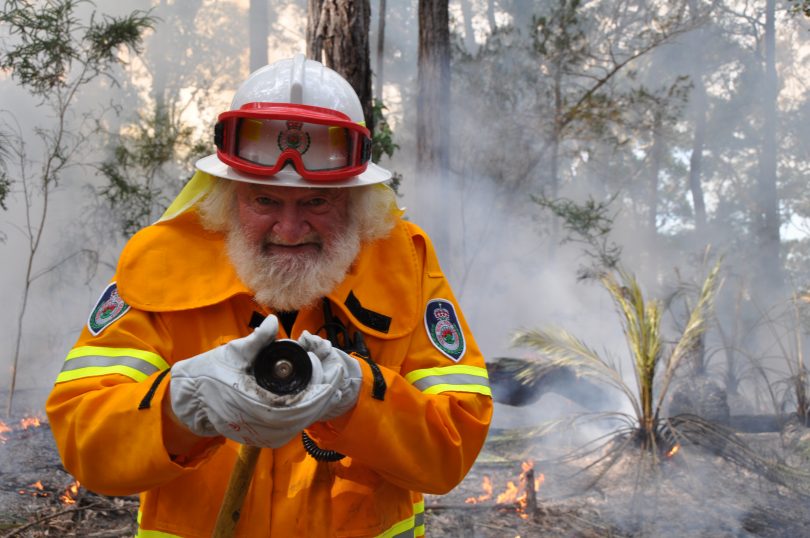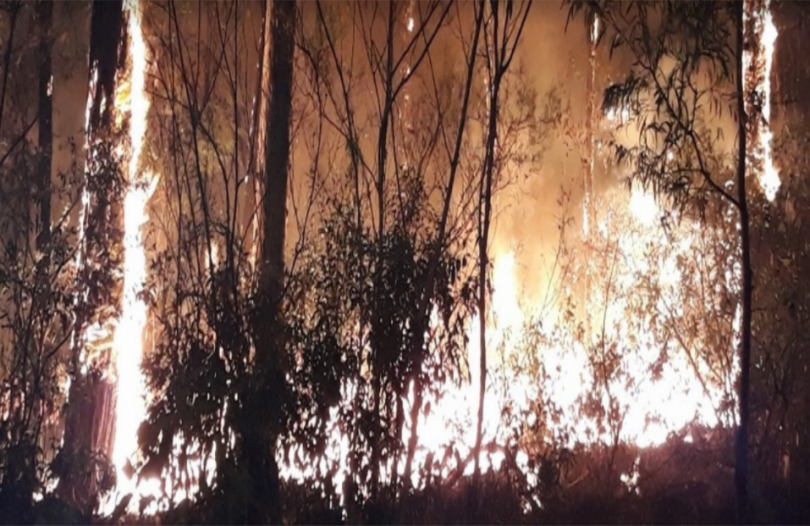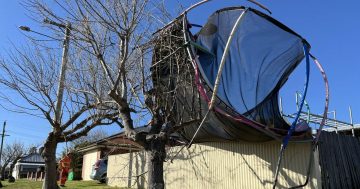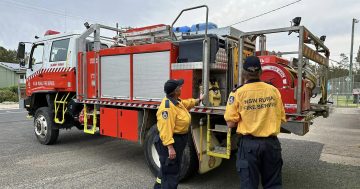
Terry McGee and other Malua Bay residents stayed to defend their homes from the New Year’s Eve bushfire. Photo: Jesse Rowan.
A Malua Bay resident, who stayed to defend his street with neighbours during the 2019 New Year’s Eve bushfire, is calling for a trial of community fire units in the Eurobodalla Shire.
Terry McGee says there should be a second line of defence in addition to the NSW Rural Fire Service (NSW RFS) and Fire and Rescue NSW (FRNSW) during bushfires.
The 2019-2020 bushfires in the Eurobodalla destroyed 461 houses, 76 facilities and 716 outbuildings, and damaged an additional 226 houses, 27 facilities and 224 outbuildings, according to Eurobodalla Shire Council.
“Now add the costs in human and animal terms, and all this despite having RFS fire stations in [almost] every town and some aerial resources,” says Terry. “It clearly wasn’t anywhere near enough [to fight the bushfires].”
Terry was an RFS member and says he values the organisation, but he recognises the RFS “can’t be everywhere at once”.
On New Year’s Eve, Terry found himself in the middle of an informal community fire unit on his street. He had decided to stay to defend his home and was able to contribute 10,000 litres of water, a petrol fire pump and three fire hoses to the firefighting effort on his street.
“All were residents of the street, apart from three who were sons of residents,” Terry recalls. “Four people – myself and my partner, and two of the sons – had prior RFS experience. The others were handy, confident people.
“We quickly agreed on arrangements and protocols. We would work as a pack, identifying and servicing the point of greatest need. The strident blowing of car horns would alert us to dangers and needs. By that point, all comms such as mobile phones, landline phones, internet and radio were out.”

The New Year’s Eve bushfire came close to Terry McGee’s house in Malua Bay. Photo: Supplied.
After a long fight and several nights of little sleep, Terry’s informal unit won with the help of a water bomber and Malua Bay Rural Fire Brigade controlling the bits beyond where their hoses could reach.
Terry says there are lessons to be learnt from the official community fire units that exist in the ACT and NSW.
Community fire units (CFU) were established in the ACT after the devastating 2003 Canberra bushfire. Today, 50 CFUs, comprising around 850 volunteers, exist in the ACT.
Each unit is a team of local residents who live close to bushland areas across the ACT. These local volunteers are trained and equipped by ACT Fire and Rescue to safeguard their homes during a bushfire until fire services arrive.
A typical CFU team consists of eight to 30 members and has a designated area encompassing 50 to 80 homes.
FRNSW also introduced a CFU program in 1994 after a number of devastating bushfires swept through the state. The program currently has more than 500 units and 4770 volunteers.
The cost of establishing a CFU is about $26,000 and it can be established upon the community’s request, a FRNSW spokesperson told Region Media.
However, interested members of the public would need to complete relevant training and a risk assessment. There would also need to be sufficient funding and a trailer available to the unit, and support from the FRNSW zone commander, said the spokesperson.
Region Media also spoke to the RFS about Terry’s idea of establishing CFUs in Eurobodalla.
NSW RFS inspector Ben Shepherd said it is positive the community wants to be better prepared for future bushfires, but shares safety concerns about CFUs.
“Post any fire event, we often see the community is ready to react,” he said. “However, that community may not see fire for 10, 20 or 30 years and that’s when we see the diminishment of their concern and state of preparedness. We saw this in 2009 when people swore they’d be better prepared and do more hazard reduction, but now it’s just a past event. So initiatives like this are good, but they need community drivers as well.”
Inspector Shepherd also said that traditionally CFUs are asked by the RFS to leave under evacuation orders because “they’re not technically firefighters”.
He suggested joining a RFS brigade could give residents “more experience across a wider area and not just in their street”, but conceded that more RFS members didn’t always equate to more RFS trucks or equipment.
Terry says not every street would need a CFU, however streets on the urban-rural fringe should take priority.
“Let’s take the stand there – don’t let the fire into the suburbs,” he says. “By then, we’ve lost.”
Terry has written a paper advocating for CFUs in Eurobodalla and hopes to form a working group to discuss the idea with representatives from Eurobodalla Shire Council, FRNSW, RFS NSW and other residents.
Bush Fire Management Committees already exist under the RFS, and Eurobodalla Shire Council responded to Terry’s paper by suggesting he speak to his local RFS brigade.
However, as Inspector Shepherd told Region Media, “it’s good that communities are having conversations about bushfire preparedness”.
Terry hopes his proposal leads to a trial of CFUs in Eurobodalla, or at the very least his proposal is taken seriously and rejected on compelling evidence.
“I’m not interested in promoting something that won’t work, but I’m not prepared to give up without trying,” he says.
Original Article published by Hannah Sparks on About Regional.














